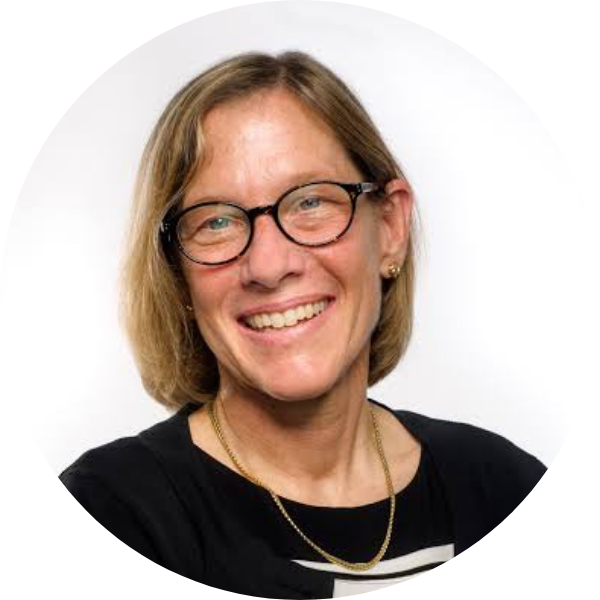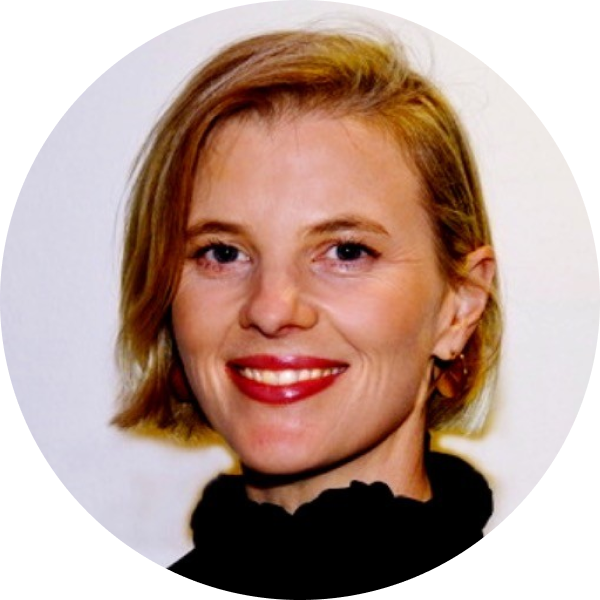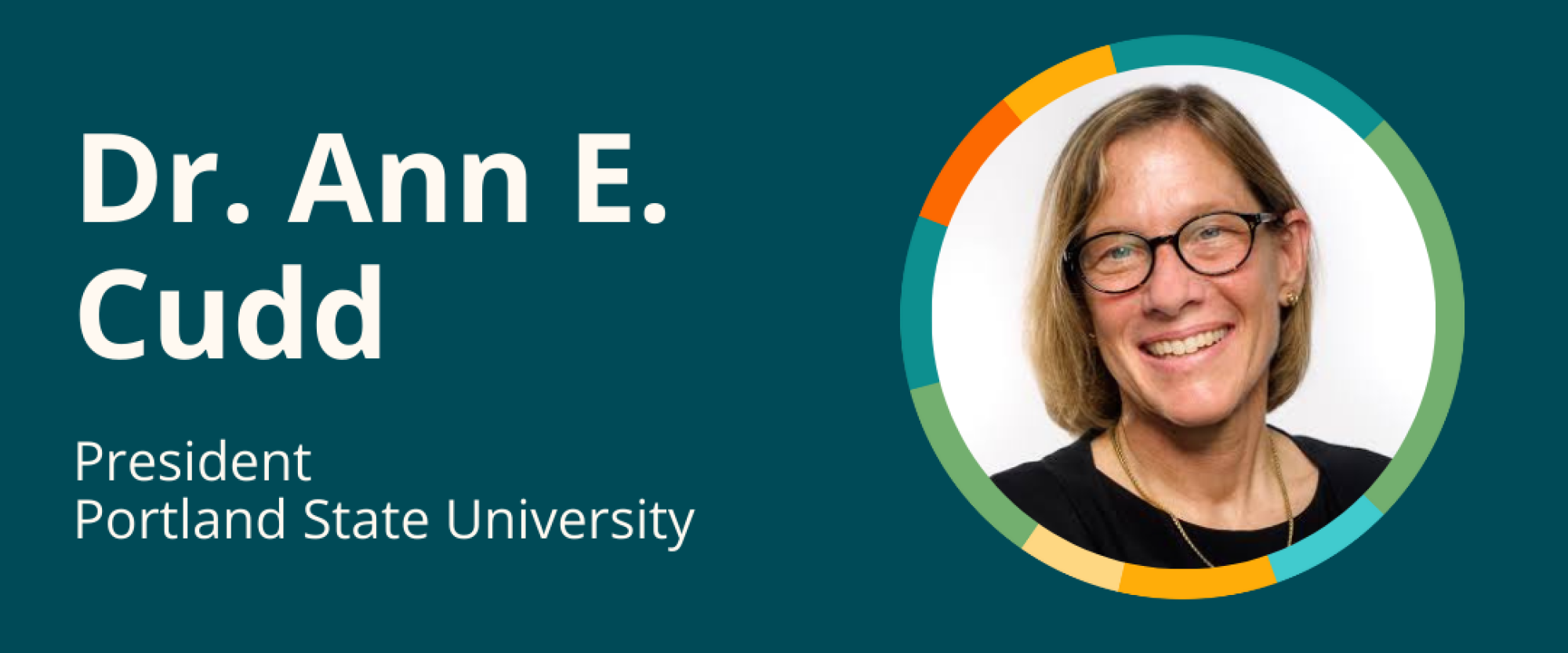Higher education leaders today are navigating extraordinary pressures, from campus protests to questions about the value of a degree. Portland State University President Dr. Ann E. Cudd has faced all of that in her first years as president. A distinguished philosopher and seasoned administrator, President Cudd brings both resilience and a deep sense of purpose to her leadership.
In this conversation on The Innovating Together Podcast, President Cudd reflected on the mentors who shaped her, the challenges of leading during campus protests, and why Portland State’s mission of accessibility and social mobility drew her in. For leaders across higher education, her story is a reminder that empathy, courage, and clarity of purpose are essential tools for navigating disruption.
Models for Leadership
When reflecting on who shaped her approach, President Cudd pointed to two leaders who offered very different, but complementary, lessons.
Kim Wilcox taught her the value of empathy and adaptability: listening carefully and being willing to change course when new information demands it.
“One time on a committee, we thought we had a great idea. And then he heard a profound criticism of that idea, and he pivoted. And I thought, that's worth modeling, pivoting when it's important.”
She observed the power of conviction from Michael Crow, holding steady to a bold vision even in the face of skepticism.
“Over the years, I have watched [Michael Crow] make bold decisions that are innovative and transformative. There are many skeptics who push back, but he really believes in his vision, and he pushes through and doesn't let the naysayers keep him from doing what he knows has to be done. And I just admire that a lot.”
Together, these examples highlight a balance that’s essential for higher ed leaders today: pairing empathy with decisiveness, and adaptability with courage. It’s a reminder that systems change requires leaders who can both pivot when needed and push forward when the vision demands it.
Leading Through Disruption: Lessons from Campus Protest
Within months of beginning her presidency, President Cudd faced one of higher education’s most pressing challenges: navigating student protests. For her, it echoed the unrest she remembered as a child during the Vietnam War era, but it also brought new urgency in today’s climate.
“Free speech and the right to protest are incredibly important. But supporting them also means putting guardrails around it so it doesn’t cause unjustifiable harm to the campus community.”
Rather than viewing protest as purely disruptive, President Cudd frames it as part of higher education’s role in democratic life. The key, she notes, is creating structures that honor free expression while also protecting the safety and learning environment of the broader community.
She recalled advice from former University of Pittsburgh Chancellor Patrick Gallagher: “The number one job is to keep people on campus safe.” That principle became especially clear during the occupation of PSU’s library, where leadership required both decisiveness and compassion.
For other leaders, the lesson is clear: systems change doesn’t mean avoiding conflict. It means building frameworks that can absorb disruption, protect safety, and still move the mission forward.
Aligning Personal and Institutional Values
For President Cudd, choosing Portland State wasn’t about prestige or continuing along the R1 pathway of her past roles. It was about finding an institution where her personal values could align with the mission at scale.
Portland State’s motto, “Let knowledge serve the city,” immediately resonated with her. As a social and political philosopher who has spent her career examining inequality, she saw in PSU’s accessibility and social mobility mission a chance to meaningfully put those ideas into practice.
“I thought I could, at scale, make a difference in the area of social mobility,” she reflected.
That sense of alignment mattered more than reputation. PSU’s urban mission gave her the opportunity to address equity gaps in a knowledge economy where privilege too often determines who gets access to the best education.
Her decision offers an important reminder for other leaders: the right fit isn’t about the size of the endowment or the level of national prestige. It’s about working in a place where your values and the institution’s purpose reinforce each other. That kind of alignment fuels resilience, sustains energy, and makes it possible to take on the difficult work of systemic change.
How Leaders Can Maintain a Sense of Purpose
President Cudd believes that appreciating her role in the bigger picture has always helped her retain a sense of purpose and whatever resilience she needs. In graduate school, she was always grateful for her mentors’ time and attention. Gratitude, she said, is still key.
She pointed to moments like graduation and new student orientation as powerful reminders of purpose.
“Orientation is second to graduation as one of the happiest and most fun things. To look out at new students and families and say, ‘Yes, you belong here,’ is incredibly meaningful.”
These experiences reinforce what she sees as higher education’s noble mission: helping people feel they belong, empowering them to exercise agency, and opening pathways for them to achieve their dreams.
President Cudd also acknowledged that this perspective comes from a deep sense of gratitude for her own mentors, for the opportunities she’s had, and for the city of Portland itself. That mindset keeps her grounded and helps her stay resilient in the face of conflict or crisis.
Her reflections point to a broader lesson for leaders: purpose doesn’t just come from strategy documents or vision statements. It’s sustained in everyday reminders, moments of joy, and a commitment to seeing the gifts in front of you, even during the hardest seasons of leadership.
Received and Acquired Knowledge in Higher Ed Leadership
Do we accept what we’re taught, or do we seek out what we want to learn? For President Cudd, higher education was a way to actively pursue knowledge and broaden her worldview. Her freshman year at Swarthmore College introduced her to people and experiences that broadened her horizons with diversity far beyond what she’d encountered in her rural Ohio upbringing.
Her career-defining moment as an undergraduate, discovering Wilfrid Sellars’ Empiricism and the Philosophy of Mind, drew her to the graduate program in philosophy at the University of Pittsburgh, where Professor Sellars taught and wrote.
“The core idea is called the Myth of the Given, which is the view that all of our knowledge comes from sensory or perceptual experience, given to us from the world around us. But Sellars argued that there's just as much taking as there is giving, in that we always apply a theory to whatever it is we're perceiving.”
This lesson, that knowledge is never passively received but actively constructed, the idea of pushing beyond received wisdom to actively pursue and acquire knowledge, and using that knowledge to make meaning for others, continues to inform how President Cudd approaches leadership: not as accepting the given, but as seeking, questioning, and creating meaning with others.
What stands out most from President Cudd’s story is the mix of empathy, resilience, and a steady sense of purpose. She reminds us that leadership isn’t about prestige, but staying true to your values, keeping people safe, and creating space where everyone feels they belong.
Her reflections offer a timely reminder that even in moments of disruption, it’s possible to lead with clarity and optimism while keeping the bigger mission in focus.
Note: This episode of the University Innovation Alliance’s Innovating Together Podcast originally aired on July 14, 2025. The podcast appears live on YouTube, Facebook, Twitter, and LinkedIn.
Resources Mentioned in this Episode
- Portland State University
A public university within Oregon’s largest city, enrolling over 20,000 students with a mission of enabling social mobility for all. - Empathy, Collaboration, and Engagement in Higher Education
A related conversation with Dr. Kim Wilcox, the recently retired chancellor of University of California Riverside, who was Ann’s mentor early in her career at University of Kansas. - No Excuses: The Urgent Responsibility of Public Higher Education
A related conversation with Dr. Michael Crow, currently president of Arizona State University, who has inspired Ann for years with his model of higher ed leadership. - Empiricism and the Philosophy of Mind – Wilfrid Sellars (1956)
Ann mentioned encountering this groundbreaking work as an undergraduate, which inspired her to pursue her extensive graduate work in philosophy.
Watch the Archive
Bios of Guest and Co-Hosts

Dr. Ann E. Cudd became Portland State University’s 11th President in August 2023. Prior to this, she served as provost and senior vice chancellor at the University of Pittsburgh, Dean of the College of Arts and Sciences at Boston University, and Vice Provost and Dean of Undergraduate Studies at University of Kansas. During her time at University of Kansas, she was also Director of the Women, Gender, and Sexuality Studies Program and Director of Graduate Studies in the Department of Philosophy. From 1988 through 2023, concurrent with her other positions and including two years at Occidental College, Dr. Cudd has taught philosophy as an assistant, associate, full, and distinguished professor. Her research has spanned social and political philosophy, philosophy of economics, feminist theory, and philosophy of social science. A study of gender, justice, feminism, and oppression culminated in her award-winning 2006 book Analyzing Oppression. She has also co-authored Capitalism For and Against: A Feminist Debate with Nancy Holmstrom. Dr. Cudd has co-directed the Mentoring Project, co-edited Hypatia, and currently serves as Vice President of the American Association of Legal and Social Philosophy and on the Executive Committee of the American Philosophical Association. She earned her B.A. at Swarthmore College as a double major in mathematics and philosophy, going on to University of Pittsburgh to two M.A. degrees in philosophy and economics, and a Ph.D. in philosophy with a dissertation in the philosophy of game theory on common knowledge.

Co-Host: Bridget Burns, Executive Director, University Innovation Alliance
As a trusted advisor to university presidents and policymakers, Dr. Bridget Burns is on a mission to transform the way institutions think about and act on behalf of low-income, first-generation, and students of color. She is the founding CEO of the University Innovation Alliance, a multi-campus laboratory for student success innovation that helps university leaders dramatically accelerate the implementation of scalable solutions to increase the number of college graduates.

Co-Host: Sara Custer, Editor-in-Chief, Inside Higher Ed
Sara Custer became Inside Higher Ed’s editor-in-chief in 2024 after serving four years at Times Higher Education. At THE, she worked across departments to launch and grow the Campus platform, and then lead its editorial team. Prior to that role, she served as digital editor, helping to launch THE’s newsletter strategy and overseeing daily, weekly, and monthly publications. Ms. Custer was previously editor and senior reporter at The PIE News, a website and magazine covering the international education industry. She grew up in Cushing, OK., and earned a B.A. in English literature from Loyola University Chicago and an M.A. in international journalism from City, University of London. As a journalist, she has covered global higher education for more than five years.
About Innovating Together
Innovating Together is an event series that happens live on YouTube, Facebook, Twitter, and LinkedIn. It also becomes a podcast episode. Every week, we join forces with Inside Higher Ed and talk with a higher education luminary about student success innovations or a sitting college president or chancellor about how they're specifically navigating the challenges of leadership. We hope these episodes will leave you with a sense of optimism and a bit of inspiration.
Rate, Review & Subscribe
Learn why hundreds of people have rated the Innovating Together podcast 5 stars. Please join others and rate and review this podcast. This helps us reach and inform more people -- like you -- who are committed to helping more students succeed.
Click here, scroll to the bottom, tap to rate with five stars, and select “Write a Review.” Then be sure to let us know what you loved most about the episode. Also, if you haven’t done so already, subscribe to the podcast. You'll never miss an episode.

